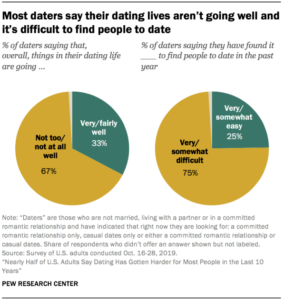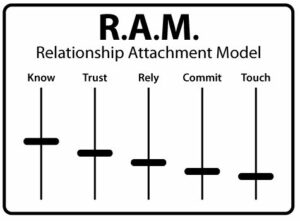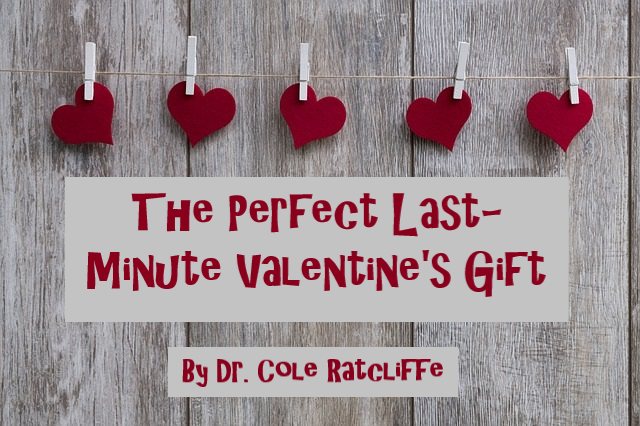by Guest Blogger | Nov 26, 2022 | Guest Posts
Many of you may be wondering why in the title of this article pop-culture dating is so bad tat it has to be compared to a polluted pond or a picture of a dead fish.That will be explained as this article goes on, but first, ponder this:
Does a fish that has lived in polluted water its entire life know that it is in polluted water? In other words, does the fish need to swim in clean water to know about pollution?? As you think of this analogy, reflect on your own dating experiences for a minute. How was it overall? What kinds of activities did you do? Was your experience mostly positive or negative? These questions might lead you to think back on some hilariously awkward, stressful, or anxiety-provoking situations that you felt during those times. I have plenty of dating experiences myself that fit that description, especially as a current college student. In my experience, people–or maybe it’s just college students–do not know how to date.
–
During my first three semesters of college, I was not asked on one date, just “hangouts”. When I did end up going on dates–because I caved in and downloaded a dating app–it felt as if I was only there to provide physical touch for guys that craved it. No bueno. It was so stressful and I started to despise going on dates and “hangouts” disguised as dates. It was clear that the dating culture I was suddenly immersed in was no longer about doing fun things and getting to know a wide variety of guys, it had now become people using one another fulfilling their wants masquerading as “needs”. Regardless of how each of us views our past dating experiences, think of how the current dating culture might impact young people today–especially your own children. How might it affect their relationships 20 years from now? How is this polluted dating culture affecting your relationships now?
–
According to the Pew Research Center, most people in the dating scene are not satisfied and think finding a significant other has gotten even harder today than it was in the past. Of those that are currently dating, 67% said that overall, their dating is not going well. Only 33% of daters in the study say that their dating is going very or fairly well overall (see chart).

So how did we get here? How did dating become something so negative? And why do we even still do it?
Unless you are Patrick Star and live under a rock at the bottom of the sea, you have probably noticed–especially on college campuses today–the popular terms of “hanging out” and “hooking up.” Hanging out is essentially watered-down dating without intention or purpose. Monto and Carey (2014) specify that hooking up is “a pattern involving transitory sexual interactions between partners who have no expectation of a continued romantic relationship or sexuality outside of a committed relationship.” In other words, hooking up is:
Sex without strings and relationships without rings.
For most people, especially those engaging in these activities, this phenomenon might not seem like such a bad thing. However, many studies have found that casual sex and the hang-out/hook-up culture can increase psychological distress, anxiety, depression, in addition to “[lowered] self-esteem and reduced life satisfaction” (Napper et al., 2016). I don’t know about you, but these outcomes do not sound very appealing. I personally have experienced these negative outcomes in my own life and can see them in the lives of my peers.
The Polluted Waters
Now back to the fish in polluted water. As you’ve probably already guessed, we young people are the fish and this toxic dating culture is the polluted water. Figuratively speaking, some of us have only ever known polluted water. And just like the fish, if you’re in this toxicity long enough, it can be harmful to your overall health. But there is hope! We can clean the “dating water” we are in and break the cycle creating a new environment for ourselves and our relationships. But how?
Using Dr. Jon Van Epp’s Relationship Attachment Model (RAM), we can gain some insight into good and healthy dating attitudes and habits. The RAM model (see image) is built with five sliders that are labeled: know, trust, rely, commit, and touch. Each of these are important components of any and all relationships. Dr. Van Epp explains in his book How to Avoid Falling in Love with a Jerk that each slider should be slightly lower than the previous one…in ascending order. This simply means, it is important to know someone more than you trust them; and to trust them more than you rely on them; and to rely on them more than you are committed to them; and to commit to them more than your amount of physical touch.

The dating culture today–which is generating more emotional and mental health problems–is more of a “Relationship Detachment Model.” Physical touch is often the highest slider, rather than one’s knowledge of and trust in the person with whom they are having sex.
Essentially, research has discovered that healthy dating (i.e., clean water) follows this model and helps to build stable and satisfying relationships that can then enhance future families and society as a whole.
If more of us follow this model, especially in high school or college, the dating waters will be clean and individuals and couples will thrive, both in these dating stages and later on in marriage or with our families. The principles of the RAM have changed me and the way I approach dating for the better! I strongly encourage you to read How to Avoid Falling in Love with a Jerk, incorporate its ideas, and teach others to do the same.
Sydney Stratton is from Lubbock, Texas, and is a junior in Marriage and Family Studies at Brigham Young University – Idaho. She is currently the Vice President of the Child and Family Advocacy Society on campus.
by Guest Blogger | Feb 12, 2019 | Guest Posts, Marriage
Valentine’s day is upon us, which means, among other things, overpriced chocolate and roses. For struggling relationships, it may provide a disappointing reminder of the love that you don’t feel. For others, it’s an exciting day to celebrate your love. And for some, it’s an opportunity to try to get your relationship back on track.
No matter what the current state of your marriage, I’ve got the best and most simple Valentine’s gift you could give to yourself and your spouse. When I say best, I don’t mean most expensive or even most creative. When I say simple, I don’t mean easy. But what I do mean is that this gift could do more for your marriage than perhaps anything else.
The Gift
For the rest of this year, until December 31st, your gift is a non-negotiable commitment to do something (which I will describe below) every day. This means that you refuse to go to bed without doing this thing. This means that you are committed to do this even if you are tired, don’t feel like it, or even if your spouse is acting like a jerk. This isn’t their gift to you, it is your gift to them. So, give it no matter what. And if you forget, it is a commitment to make it up by doing two things the next day. Here is your daily objective:
Every day, do ONE thing that sends a clear message to your spouse that you love them. Don’t do the same thing every day. Mix it up a bit. Spend a few moments contemplating the needs and desires of your spouse, and then respond to their needs or desires in a thoughtful and loving way. Do this without telling your spouse that this is your gift.
Where to Start
For those who don’t know where to start, here are a few ideas:
- Write a love note and hide it in a place you know they’ll find it
- Do a household task that your spouse normally would do, expecting nothing in return
- Offer to give your spouse a back or foot rub, whichever they would prefer
- Pick up their favorite treat while you’re at the store
- Look your spouse in the eye and tell them one thing about them that you are truly grateful for
- Initiate some form of physical touch: a kiss, a hug, a hold, or even sexual intimacy (you should be able to guess whichever they would prefer)
- Suggest that you watch a movie that they would like to watch, even if it’s not something you would ever want to watch
- Surprise your spouse with a breakfast or lunch date
- Send a quick mid-day text to your spouse asking them how their day is going to just to say, “I’m thinking about you. I love you.”
- Offer to watch the kids or finish some household tasks while your spouse does something that he or she would like to do
Commit to Love
Buying flowers or chocolate would be a lot easier and even more flashy. But chocolate and flowers won’t produce the effect on your marriage that you really want. You want to feel in love and feel joy in marriage. You want your spouse to know that you really do love them, even though you sometimes don’t act like it (and maybe sometimes don’t feel like it). And you want to set a powerful example to your children that love can be constant in marriage and that there really is love at home.
This is what you really do want, so make a commitment on Valentine’s Day to go get it — even if you think that some of these things are not possible for you. Research shows that you can maintain a strong romantic connection throughout your marriage — if you really want it. What does it look like to really want it? The type of daily, non-negotiable commitment I’ve described.
Why You Should Give This Gift
If you are in a struggling marriage, this type of gift may seem too difficult or even pointless. I promise it’s not. Here is why this activity is not too difficult or pointless and is good for all marriages, even in very difficult circumstances:
- It is one simple thing a day. Anybody can do that every day. It’s a small price to pay for a significant improvement in your quality of life.
- You increase the chances that loving feelings will return to your marriage (if they’ve been lost) to both you and your spouse. Loving feelings are the fruit of loving thoughts, words, and actions. If loving feelings are already there, this gift will help you maintain those feelings even when life gets hard.
- Your perspective on your spouse and your marriage can improve significantly because every day you are placing more effort and focus on the positive (in thought, word, or deed). For those who already have positive views of their spouse, this gift can protect those views. For those who are struggling, this can help you break out of destructive thought cycles.
- You will become a better person and develop a critical life skill: You will learn that you can choose to act certain ways even though you may not feel like it. This is a critical life skill for any successful marriage. This is also a life skill that is required if we are to find joy in any circumstance.
For Valentine’s Day, this is the gift your marriage needs. (Because you are not going to tell them that this is your gift, it might also be a good idea to provide some chocolate or flowers. 😉 ) However, over time, your real gift will taste better than chocolate and smell better than roses.
This article was originally published at www.byuido.org titled “Need a Last-Minute Valentine’s Gift? Here’s the Best Valentine’s Gift You Could Give“.
Dr. Cole Ratcliffe has a PhD in Marriage and Family Therapy from Kansas State University. He currently practices marriage and family therapy and teaches at Brigham Young University- Idaho. He also heads a team of Certified Relationship Educators in sharing their knowledge with those who want to strengthen their relationships.
by Rob Stewart | Feb 14, 2018 | Marriage



Growing up, Valentine’s Day may have been my 23rd favorite holiday of the year. In fairness, I’m not sure if there are 22 other holidays. Still, you get my point.
It wasn’t that I hated Valentine’s Day. Rather, as a younger version of the male species, I was utterly indifferent to the holiday. What’s more, Valentine’s Day had the misfortunate of aligning itself with my least favorite month of the year.
To a young Dr. Rob (who was certainly no doctor and actually went by Robby at the time), February was the most flawed month. I mean, can’t we all agree that we’ve had our fun with winter by the 2nd month of the year? By February it’s been cold for way too long (at least where I’ve lived), it’s been dark for a long time, and spring still isn’t all that imminent. The one saving grace for February is that it has enough sense to only have 28 days . . . most of the time.
Returning to my previous apathy for Valentine’s Day, you might ask, “Didn’t you have a crush growing up? Didn’t you like girls?” To that I answer with a resounding yes . . . but, shy as I was, none of them ever knew about it. 🙂
But alas, fast forward to 2018 and I now genuinely love this holiday . . . and yes, this a guy we’re talking about (see 48 second mark).
Valentine’s Day Tip #1: Focus on love, not just romantic love
I often hear individuals reference Valentine’s Day as “Single Awareness Day.” I really do understand that this day, which often focuses on romantic love, can be hard for those either not in a relationship or not terribly happy in their current relationship.
However, focusing more on others and less on ourselves has been and always will be a secret to happiness. So whether you’re 20 years into the marriage of your dreams or that type of relationship remains a future dream, I encourage you (and each of us) to look for ways to help others feel special and loved during Valentine’s Day!
Valentine’s Day Tip #2: Focus on intimacy (no, not that kind)
This second tip is for those of us who are married. This strategy is just as helpful for those who’ve been married for 5 months as it is for those who’ve been married for 5 decades.
I’ve written in the past about the need for couples to prioritize physical intimacy (here, here, here, and here). No, my thoughts have not changed. Keep prioritizing physical touch on Valentine’s Day and every other day.
However, today I’m talking about the need for emotional intimacy. This form of intimacy leads to the sweet closeness and friendship that you observe in the happiest of marriages. According to Dr. John Gottman, the most successful marriages are built on a deep and abiding friendship.
There are obviously many ways to build a friendship (romantic or otherwise). Not surprisingly, marriages that are filled with kindness, forgiveness, and intentional time together are much more likely to be happy.
For the sake of this article, I want you to focus specifically on another strategy that can help increase the emotional intimacy in your marriage – developing an ongoing love map. Dr. Gottman refers to love maps as knowing the little things about your partner’s life, which creates a strong foundation for your friendship and intimacy.
Understanding the concept of the love map is not too challenging. The challenge comes in prioritizing the time needed to connect. However, as we put down the technology a little more, prioritize date night and couple time, and really focus on understanding and knowing our spouse (hopes, dreams, fears, etc.), each of us can increase the emotional intimacy in our marriages!
From the team at Family Good Things, we not only wish you a happy Valentine’s Day but hope you make this one to remember!

Please help us strengthen families by sharing this article with your friends and family! For more of Dr. Rob’s articles (as well as articles by Dr. Tim), be sure to also check out the rest of our
blog and our
Facebook page.
by Rob Stewart | Feb 14, 2017 | Marriage

Falling in Love While on a Chemical High
Do you remember how much time you spent with your spouse when you were first dating?
I’m guessing that you spent every possible moment together. Other “stuff” wasn’t as important as spending time with your new love.
Many students see their grades begin to slide when they fall in love. Similarly, work performance often suffers during this time.
Why is that?
As couples begin to fall in love they experience an initial “chemical high”. According to Dr. Pat Mumby “Falling in love causes our body to release a flood of feel-good chemicals that trigger specific physical reactions.”
You remember those days right!? Sweaty palms, a racing heart, and when you were apart (which wasn’t that often) your thoughts were still centered on your guy (or your girl).
These chemicals (dopamine, adrenaline, oxytocin, norepinephrine) are actually quite useful in helping us fall in love as well as helping us desire to progress to courtship and marriage.
But, what happens when the chemical-levels drop?
Something better?!
This “high” doesn’t last though. After a few months, our body’s chemical levels return to a more normal level.
This is actually a really good thing- otherwise most of us would have flunked out of school or been fired from our jobs. The “love high” can be fun, but it is difficult to live a productive life in that chemically altered state.
But, does our love fade when this “high” is gone?
Well, it depends!
There are plenty of neglected marriages which leave both individuals riddled with hurt, disappointment, bitterness and anger.
By contrast, when couples choose to continue to prioritize their marriage (long after the initial “high”), then this relationship can grow into something much deeper and sweeter than anything experienced during the “chemically aided” beginning of their romance.
The Intentional Marriage
Before you were married, you were likely very intentional about spending time with your significant other. Sure, the “chemical high” helped, but by choosing to prioritize your relationship, you grew closer and had an ever increasing amount of love for each other.
However, according to William J. Doherty, PhD:
When we get married and especially after we have children, this reverses. Other things – the children, our work, our hobbies, even our religious involvement – become central and the marriage recedes to the background and only receives our attention when something is wrong.
Does this describe your marriage?
I hope not . . . but it might.
I have seen countless couples (even marriages between two wonderful people) who allow their relationship to fall into the background.
Valentine’s Day Vows
If your marriage is currently in the background, will you decide today to recommit to your sweetheart? Will you decide to prioritize him (or her) above all others?
Commit to prioritize your sweetheart about your career!
Commit to prioritize your sweetheart above your hobbies!
And, yes, even commit to prioritize your sweetheart above your children!
When describing this type of a marriage, Dr. Doherty noted that the happiest of couples have an absolute commitment towards each other and their marriage. He noted that happily married couples make these type of vows to each other:
- “Nothing will break us up.”
- “We will fight through whatever obstacles get in our way.”
- “We will renovate our marriage if the current version gets stale.”
- “If we fight too much or too poorly we will learn to fight better.”
- “If sex is no longer good we will find a way to make it good again.”
- “We will accept each other’s weaknesses that can’t be fixed”
- “We will take care of each other in our old age.”
He then concludes that in these happiest couples, these commitments aren’t simply made one time but are renewed over and over throughout a lifetime.
Please help us strengthen families by sharing this article with your friends and family! Likewise, to see more of Dr. Rob’s articles (as well as articles by Dr. Tim), please also check out the rest of our
blog and our
Facebook page.
by Guest Blogger | Jun 21, 2016 | Advocacy, Guest Posts, Parenting

Guest Writer: Dina Alexander, founder of Educate Empower Kids
Almost three years ago I had my first “porn talk” with my kids. This came about after reading a simple article about teens and their ever increasing access and inevitable use of pornography. As I read, I became frustrated, then scared and finally determined. I knew I had to educate my kids immediately about this danger, as well as every parent I came in contact with.
I didn’t have all the answers that first day, but it didn’t matter. I opened the door to a new dimension in my relationships with my three kids. A dimension that brought a closeness and unity to our family that was not there before.
Just days after this first talk, I began doing serious research into the devastating effects of porn consumption by children. I read, I dug, I pondered, I planned and within a few months I had created a non-profit organization. An organization that focuses on teaching parents how to create deep connections with their kids and start some pretty challenging conversations about the dangers of pornography, and its opposite, healthy sexuality.
In those first few months of researching, organizing and layering conversations with my kids, I had a tremendous worry. Was I “giving my kids ideas” (or creating an unhealthy curiosity that was not there before)?
The answer became apparent. Yes! I was “giving them ideas.”
And I want you to give your children the same ideas.
Give your kids the idea that you are a great source of reliable, honest information. Let them know through your words and actions that you can speak calmly, comfortably and rationally about human issues that affect all of us, namely, curiosity and sexuality. As you initiate discussions about these topics and pornography, share your personal experiences, spiritual values and expectations kindly and thoughtfully, your child will soon get the idea that his parents are human and make mistakes. They will also see that you are ready to talk about “tough” topics and more importantly, listen to them. I promise you as you answer your kids questions openly and sincerely and they will come back to you for your wisdom and empathy.
I also want you to give your kids the idea that there is nothing shameful or “awkward” in asking questions about and discussing one of the most amazing experiences available to human beings: true intimacy expressed through sexuality. By discussing the positive aspects of sex, you can help them know that sexual intimacy is good, beautiful and enjoyable. Follow this up with a discussion about healthy sexuality’s opposite: pornography. Take the time to explain how porn is the opposite of intimacy, can be addictive, can condition the brain, harm relationships and damage a person’s ability to relate and empathize with others.
Finally, if you continue these discussions at each stage of development, your child will get the idea that curiosity is a God-given gift. He will get the idea that his feelings and questions are normal and natural when you let him know that any question is okay and that you will not judge him harshly for asking ANYTHING.
So if you find yourself saying, “I don’t want to give them ideas.” My answer to you is “Yes! Yes you DO want to give them ideas!” By tackling these crucial topics, you and your child will grow closer together and she will know that she can rely on you to provide helpful information in a loving manner. Here are some topics to guide your conversations:
What Does a Younger Child Need to Know About Sexual Intimacy?
- Protective Information (my body belongs to me, good touch/bad touch, how to say “no”)
- Bodily Knowledge (anatomy, functions of anatomy, where do babies come from)
- Relationship Basics (self-respect, respect for others, romantic love vs. friendships)
- Media Savvy (healthy and unhealthy media messages, body image)
- *When your child is ready, discuss the mechanics of sex
What Does a Younger Child Need to Know About Pornography?
- What it is (define it)
- Where it exists (smartphones, tablets, computers, etc.)
- What to do when you see porn (Name it, Get away from it, Tell parents, Discuss feelings with seeing it, Deconstruct the images seen, How to prevent further exposure)
- Why it should be avoided
What Does an Older Child/Teen Need to Know About Sexual Intimacy?
- Sex is healthy and amazing
- Intimacy (connecting with another human being) should be the focus
- Positive and negative aspects of sex
- Protective Information (consent, how predators groom kids/teens)
- Bodily Knowledge (puberty, body image, masturbation, mechanics of sex)
- Relationship Advice (self-worth, boundaries, healthy vs. abusive relationships)
- Media Savvy (healthy/unhealthy media messages, sexting, social media)
What Does an Older Child/Teen Need to Know About Pornography?
- There is an industry targeting him/her
- It is addictiveIt destroys relationships
- It is damaging to society
- There is a way back from a porn habit/addiction
For more helpful information, conversation starters and great discussion questions for you and your kids, please check out How to Talk to Your Kids About Pornography, 30 Days of Sex Talks, Empowering Your Child with Knowledge of Sexual Intimacy or 30 Days to a Stronger Child available on Amazon (LINK: http://amzn.to/1TEMnUr)















